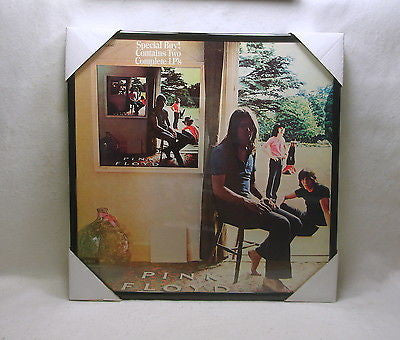
“Ummagumma” is a colloquial slang for sex (maybe). During the year, the group released the LP soundtrack to the film More and the double length half live, half studio record Ummagumma, and also recorded material which would appear on future projects.Ummagumma is a pretty good snapshot of where Pink Floyd was in ’69. The recorded output by Pink Floyd during the year 1969 was ubiquitous, original, creative and disjointed.

Released 7 November 1969 on Harvest (catalog no. 0 rating Write a review.Ummagumma, an Album by Pink Floyd. Ubuy is the leading international shopping.
Famed BBC radio host Bob Harris narrates a critical review of this 1969 masterwork comprised of interviews with such high-profile rock critics and musicians as.The first half of Ummagumma in fact so typifies the opposite of what Waters and company become by the time that definitive string of albums appeared that its hard to reconcile the sound as being a result of the same four Englishman. Featured peformers: David Gilmour (lead guitar, vocals), Roger Waters (bass guitar, vocals), Richard Wright (farfisa organ, Hammond organ, piano, Mellotron, vocals), Nick Mason (percussion. Rated 847 in the best albums of 1969.
Ummagumma is Pink Floyds first double-album with one of their most iconic cover images. Yes, it was a time of palpable transition and the search for solid footing as a band was apparent in the music itself, but with Ummagumma we have a wildly embryonic vertical slice of group that exists in a space working beyond boundaries and limitations to simultaneously create some truly singular and moving works of music worth cherishing as well as some borderline-unlistenable half-cocked noodling.Ummagumma is the fourth studio album by Pink Floyd, originally released in 1969. Though that end still remains quite overlooked and pondered for the sake of what was to follow in its wake and how Pink Floyd managed to contextualize those more experimental tendencies into songs like “The Great Gig in the Sky” or “Shine on You Crazy Diamond,” which is unfair.
As much as Pink Floyd became defined by lengthy instrumentation with Wish You Were Here, Animals, and to a lesser degree “Echoes,” “Careful” and “Saucerful,” while pushing and exceeding the ten minute mark, don’t tread the same grounds of orchestration and sophistication. International Times were particularly positive about the live album, with the reviewer describing it as.Like many I had to backtrack from Meddle to Live at Pompeii and Ummagumma in order to experience songs like “Careful With that Axe, Eugene” and “Set The Controls for the Heart of the Sun.” And, again, like many I’ve never quite forgiven the world for so perilously tossing 1968 – 1970 Floyd into the precipice of ambivalent curiosity. On release, Ummagumma received favourable reviews.
Gilmour especially seems to embody the antithesis of where he managed to stake himself as one of the best guitar players ever – focusing on soggy abstracted effects and sonic outcomes rather than emotional and technical precision.It’s worth tracking down the original cut of “Careful With that Axe, Eugene” only to compare it to where the song found itself when recorded live for Ummagumma. Perhaps the most interesting is David Gilmour and Richard Wright as the they’re often left to divining their parts on the spot, gravitating toward a the more textural and exotic. Beyond the generality of “improvisation,” which translates here into a slower-to-rise, more atmospheric and delicate, each finds an individual identity in their instrument. As a snapshot of the band you later came to worship along with everyone in it, these live cuts are endlessly fascinating for how each of Pink Floyd’s members take to their instruments. Gilmore proved to be a more aggressive and inventive guitar player than Barrett and no one yet seemed entirely comfortable to take the vocal and songwriting reigns, resulting in approach we find on Ummagumma Part 1 (and 2 for that matter). “Careful with That Axe, Eugene” features an other-worldly inhaling scream from Roger Waters and “Saucerful of Secrets” is a rhythmic tribal massacre of conflicting electronic noise punctuated by a wordless vocal melody from Gilmore.It’s easy to trace the latter three tracks of Ummagumma‘s first album to Syd Barret’s sense of psychedelia featured on songs like “Interstellar Overdrive” and Ummagumma opener “Astronomy Domine,” but without the direction of their original leader Pink Floyd seemed to push that element into less harmonized, more astrologically-bent realm.
We’ll always have Ummagumma to return to. Then I remind myself that new found sense of purpose resulted in The Dark Side of the Moon and The Wall and it’s easy not to feel so bad about it. Often times I find myself daydreaming about where Pink Floyd might have gone if they had chosen improvisation over orchestration, lamenting the more constricted direction the group decided to take during the 1970s. The difference is as telling of Pink Floyd’s place as a group in ’69 as the material on Ummagumma – a band floundering in incrementation and improvisation and poorly advised ideas, yet still able to meet some compelling ends with decidedly suspect means.


 0 kommentar(er)
0 kommentar(er)
